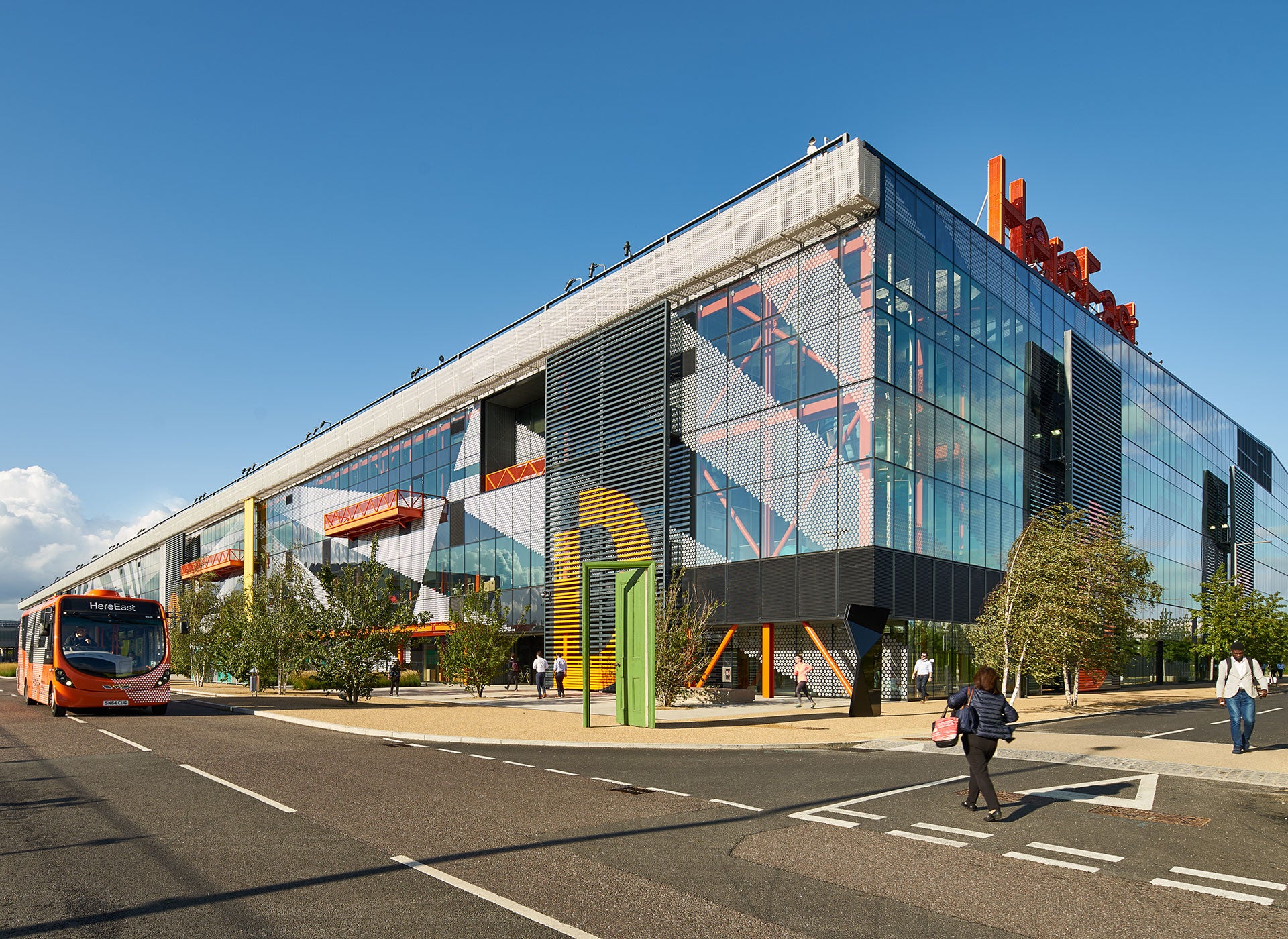
Just a stone’s throw from London’s Queen Elizabeth Olympic Park is Here East. With 3800 people working and studying onsite, the 1.2 million square foot campus is home to an eclectic mix of organisations including BT Sport, University College London, luxury retailer MatchesFashion, charity Scope and Ford Mobility.
The site was formerly the media complex for the London 2012 Olympics, the base for the 20,000 journalists from around the world covering the games.
However, it was converted by property firm Delancey and Infinity SDC with the aim of reimagining it as a tech hub for East London.
Described as a “dedicated campus, for innovators, disruptors, visionaries and locals”, since opening its doors in 2014, Here East has worked to establish itself as one of London’s key tech epicentres. With educational institutions working alongside both large companies and small startups, creating an environment that fosters innovation is central.
“There is no set blueprint for the perfect tech hub”
“There is no set blueprint for the perfect tech hub or campus like ours – the inaugural European Tech Hub Leaders meetup we hosted earlier this year demonstrated exactly that, with the diversity of approaches and models we witnessed,” says Gavin Poole, CEO of Here East. “However, I would say that true collaboration is a fundamental principle all successful tech hubs should hold close to their hearts.
“At Here East, we have purposefully curated an ecosystem where organisations are able to join if they are committed to participating fully in the campus community, sharing ideas and actively seeking opportunities for cross-sector collaboration and engaging in wider community building activities – all elements which help to improve productivity and spark creativity. Collaboration between tech hubs internationally, as well as across the UK, also plays into this; building bridges for the sharing of knowledge and ideas across cities, as well as providing a natural, ready-made base and support network for companies looking to expand to integrate into.”
How well do you really know your competitors?
Access the most comprehensive Company Profiles on the market, powered by GlobalData. Save hours of research. Gain competitive edge.

Thank you!
Your download email will arrive shortly
Not ready to buy yet? Download a free sample
We are confident about the unique quality of our Company Profiles. However, we want you to make the most beneficial decision for your business, so we offer a free sample that you can download by submitting the below form
By GlobalDataEast London, particularly Old Street’s Silicon Roundabout, has gained notoriety in the tech sphere thanks to an influx of growing startups, as well as the presence of the likes of Facebook, Google and Microsoft.
With London’s tech scene going from strength to strength, and investment in the sector reaching £10.1bn in 2019, tech hubs are emerging throughout the capital.
According to BT, a tech hub should create “an environment specifically targeted at helping young technology companies thrive by encouraging experimentation, not demonising failure, and helping firms network with other like-minded individuals and enterprises”.
However, while London has established status as a global tech capital, the industry is competing with changing attitudes to the way we work, and according to a study by professional services company Aon, 97% of employers agreed that what employees expect from their workplace is rapidly changing.
“Adapting to the desired degree of flexibility for employees”
A desire for greater flexibility, remote working and collaboration, as well as access to the latest workplace technology, has created not just design challenges, but has required organisations to rethink the best ways to encourage wellbeing, productivity and innovation.
“The younger generation wants different things to their parents now – flexibility and a belief in the purpose of the company they are working for are two fundamental expectations emerging in the young workforce”, says Poole.
“However when it comes to flexible working, employee wellbeing and productivity levels, a careful balance must be struck. A recent study of 1,900 remote workers around the world found that 21% named ‘loneliness’ as the biggest struggle with working remotely, and that it actually could hinder productivity. A shared office workspace which can meet the flexible working expectations, but also provide the base for employees to interact face-to-face and engage in a working routine can provide an ideal balance.
“Working communities such as Here East facilitate the desire for growing flexibility both within our innovation centre, Plexal, and the architectural versatility in its spaces throughout. The Here East estate is also open and accessible to all tenants 24/7, enabling companies working onsite to adapt to the desired degree of flexibility for employees which works best for all.”
For Here East, this means not just offering office space for their tenants, but also integrating co-working spaces, hosting community events and providing the necessary high tech equipment, including 3D printers and an a VR/AR zone.
Innovation over gimmicks
The UK tech industry currently facing a well-documented skills shortage, organisations must try harder than ever to attract much-needed tech talent, and individuals can afford to be more selective in choosing their work environment, with 86% of recruiters believing that it is now an employee-driver market, according to TTI Success Insights.
Poole explains that this is one of the biggest challenges facing the industry:
“The London tech scene is going to continue to grow at pace – it has the existing networks and creativity to keep driving forward genuine innovation across a range of sectors and is ready to adapt to new emerging trends. I think talent is one of the biggest challenges facing our tech sector right now but I am hopeful that with the focus on training and education we are experiencing at this moment the skills gap will be managed.”
In this climate, employers are having to offer workers a growing number of workplace benefits.Tech startups have gained a reputation for innovative office spaces, with ping pong tables, hammocks and even office slides now common sights in some workplaces.
However, a study from Kiwi Movers revealed that 79% of UK workers said that technology was more important that office aesthetics, and 86% said that “fun office features” did not add value to their work.
Here East’s innovation centre and coworking space, Plexal, is “designed to resemble a mini-city, so we have our very own indoor park, private phone booths, high street, town hall and workshop space for rapid prototyping”.
Poole believes it is important to avoid gimmicks that may not actually have the desired impact on both wellbeing and productivity:
“In an era where flexible and bespoke workplaces are fast becoming the norm, it is really important that companies remind themselves why these trends are popular as they consider productivity and worker happiness. Any changes that create unnecessary distractions for your team or disrupts their working habits in a negative way has missed the mark.”
Instead, Poole believes that a focus on authenticity, and a culture that encourages innovation is key to a good tech hub:
“Ultimately, it is about engagement – ensuring you are listening to your team members, and balancing their input with workplace productivity and culture. For example, at Here East one of our customers offices has a sports bar. This fits in with perfectly with the ethos and working style of the specific business but would be completely out of place if implemented into a different office environment. Being authentic is essential.”
Regional tech hubs
Poole believes that encouraging tech hubs outside of London will be key to ensuring the UK’s ongoing tech growth:
“In the next few years, I think we will see UK regions beyond London get the recognition they deserve for the innovation and R&D that is taking place, from Edinburgh and Sheffield to Cambridge and Bristol. For the UK tech sector to be considered successful, the rewards of such success needs to be felt around the country throughout society, not just in the South East.
“Over the coming months and years, we need to increase investment into these regional hubs, and encourage people from all backgrounds and experiences to become involved in the technology sector. Raising National productivity this way is important. I think that the London tech scene can only maintain its momentum with increased diversity of ideas and people, and boosting technological education and research throughout the whole country is one way to achieve this.
“The access to industry networks, expert advice and resources brought under one roof within tech hubs helps to enable growth and scaling for its tenants – and flexibility of space from an architectural perspective means they can expand while still remaining plugged into its surrounding community.”
Read more: Alternative UK tech hubs have little chance of catching up to London.







